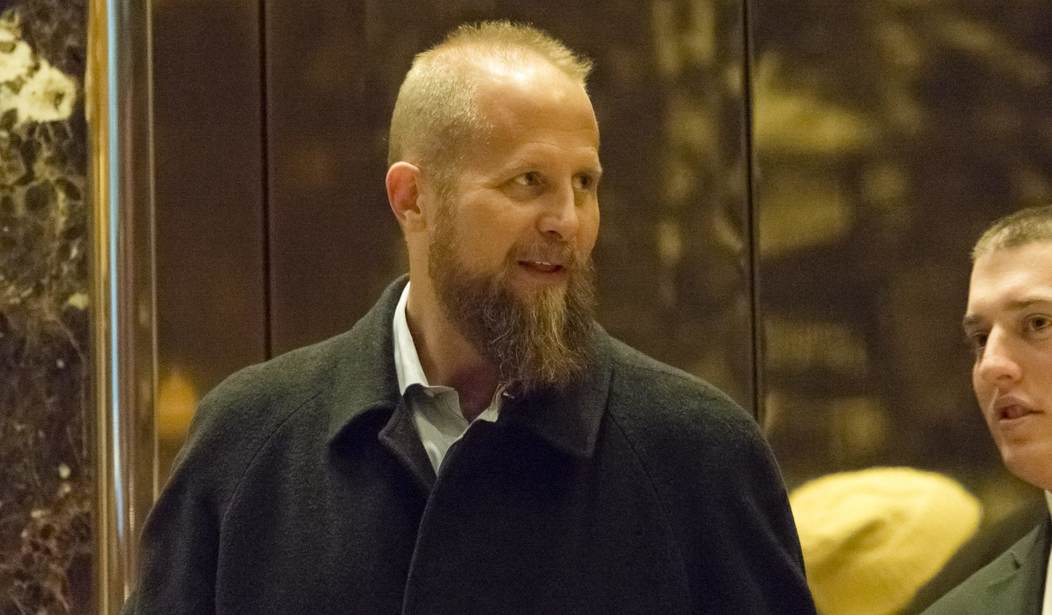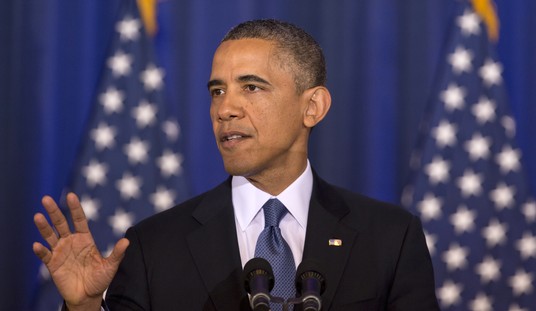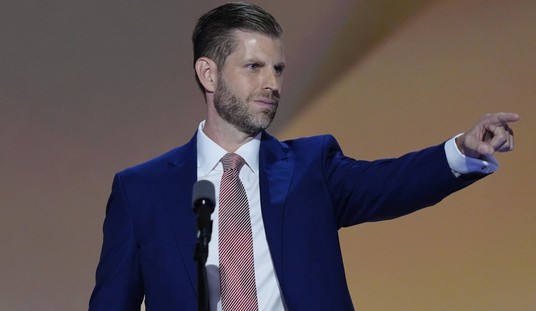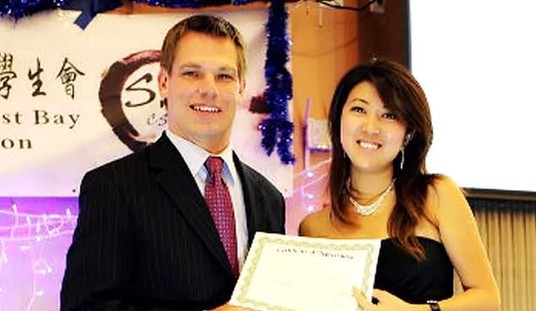On Tuesday morning, the Drudge Report reported that President Donald Trump would name his former digital media director, Brad Parscale, his campaign manager for the 2020 re-election campaign. Trump filed a letter of intent with the Federal Election Commission, announcing his plan to run for re-election, on his very first day in office.
Parscale, 42, was born in Topeka, Kansas, but moved to San Antonio, Texas, for college, later bringing his family with him. His social media strategy was arguably central to Trump’s victory in 2016.
Without further ado, here are 5 things to know about Parscale.
1. Like father, like son.
Political ambition and an entrepreneurial spirit run in Parscale’s blood. His father, Dwight Parscale, was an assistant attorney general and ran for Congress at the age of 28. He owned a restaurant and later became CEO of NewTek, a Topeka-based company that moved to San Antonio that creates live and post-production video hardware and tools.
His mother, Rita Parscale, was a small business owner.
Brad Parscale attended high school in Kansas before attending the University of Texas at San Antonio. After a back injury ended his basketball career, he graduated from Trinity University in San Antonio with a degree in finance, international business, and economics in 1999.
He sold CGI software in California for five years, but after the dot.com bust, he returned to San Antonio and started Parscale Media in 2004 with a mere $500 investment. He gained clients by approaching customers at Barnes and Noble who looked at web development books! In 2011, he partnered with Jill Giles of Giles Design, founding Giles-Parscale.
This firm, which Parscale and Giles still run, provides branding, design, digital media, website, and marketing services. Parscale also co-founded TechBloc, a San Antonio firm focused on building and expanding technology.
2. Donald Trump calls.
In 2011, Giles-Parscale began working for the Trump Organization. The firm provided website design and development and digital strategy for Trump International Realty.
Trump, or his network, must have appreciated Parscale’s work, as he hired him for digital services to the Trump Winery and the Eric Trump Foundation.
Parscale may not have known it, but this budding relationship would transform his entrepreneurial spirit into a political juggernaut, and rocket him up to the top of a presidential campaign in 2018.
3. The Trump campaign.
In early 2015, Trump hired Giles-Parscale to create a website for his exploratory campaign. The future president paid the firm $1,500 for the site. Over the course of the election, the Trump campaign would pay the firm $94 million — money very well spent.
Trump named Parscale his digital director in June 2016. The entrepreneur used social media advertising, experimenting with different fonts and slogans like “Basket of Deplorables.” Specifically, he oversaw digital advertising, television advertising, small-dollar fundraising, direct mail, and the advertising budget.
Parscale also teamed up with the Republican National Committee (RNC)’s chief of staff, Katie Walsh. He served as the vital liaison to the RNC, helping co-ordinate the efforts of a small campaign infrastructure with the RNC’s extensive efforts to bolster the campaign.
He claimed to have made the pivotal decision to write off Virginia and Ohio, focusing campaign resources on Michigan and Wisconsin. This strategic shift enabled Trump’s surprising victory, as he took both of these traditionally Democratic states.
Parscale focused campaign efforts on Facebook, hiring Facebook employees and even staging competitions between tech companies to drive the lowest cost of buying on Facebook and other social media platforms.
Finally, the digital director set up a major grassroots campaign on Facebook to help bring in funding from across the U.S.
Parscale said the Trump campaign’s willingness to spend $100 million on social media opened doors to use all sorts of tools from Facebook, Twitter, Snapchat, and Google. The companies helped the campaign spend that money effectively.
4. America First Policies.
Shortly after Trump’s inauguration, Parscale joined with other former 2016 Republican and Trump staffers to form the nonprofit group America First Policies. He co-founded the organization with Nick Ayers, a Mike Pence advisor, and Rick Gates. Katie Walsh, who temporarily served as White House deputy chief of staff, joined the organization in March 2017.
America First Policies advocates for Trump’s agenda in the public square. The group emphasizes nine key issues:
- Repeal and Replace Obamacare
- Tax Reform: Simpler, Fairer, Flatter
- Securing Our Border
- Strong National Defense and Foreign Policy
- Ending Job-Killing Regulations
- Rebuilding America’s Infrastructure
- Trade Deals for American Prosperity
- Choice in Education
- Energy Dominance
Trump presidential campaign donor Rebekah Mercer reportedly disagreed with Parscale about the direction of America First Policies, fighting for control of the organization — allegedly to sway Trump’s supporters against the president.
Watch one of the recent ads below.
5. Setting the record straight.
Ever since news broke that a Russian “troll farm” had paid for advertisements to reach 10 million Americans on Facebook, Parscale has had to defend the Trump campaign’s social media efforts and explain that the Russian involvement did not contribute to Trump’s victory.
Critically, most of the Russian ads ran after the election, and many of them supported Black Lives Matter and Hillary Clinton.
Here is the Vice President of Facebook Ads killing most of the media's #FakeNews narrative.
VP said:
* Seen all the ads
* Main goal was NOT the election
* Most money was spent after the election https://t.co/CXjBOI3v8t— Brad Parscale – Text TRUMP to 88022 (@parscale) February 17, 2018
Last week, Parscale shared a Wired article explaining the real reasons Trump’s Facebook efforts proved so successful.
Finally. @WIRED gets it right. Here is an insider at @facebook that built the system and saw behind the curtain. https://t.co/47GviJd0jv
— Brad Parscale – Text TRUMP to 88022 (@parscale) February 23, 2018
Wired’s Antonio Garcia Martinez explained two keys to Trump’s success — “without Russian ads” — Facebook’s ads auction and “custom audiences.”
The Trump and Clinton campaigns bid over the same crucial online real estate — swing-state voters. The Republican campaign proved much more effective at courting an online audience, inspiring users to respond with likes, comments, and shares. Consequently, the ads cost the Trump campaign a great deal less, because there was higher demand for them.
Parscale reported that Trump Facebook ads were “100x to 200x” more effective than Clinton ads on the platform. “I bet we were 100x to 200x her. We had CPMs that were pennies in some cases. This is why [Donald Trump] was a perfect candidate for FaceBook,” the entrepreneur tweeted.
I bet we were 100x to 200x her. We had CPMs that were pennies in some cases. This is why @realDonaldTrump was a perfect candidate for FaceBook.
— Brad Parscale – Text TRUMP to 88022 (@parscale) February 24, 2018
As The Washington Post‘s Philip Bump explained, “Clinton’s campaign paid hundreds of times what his campaign did to run 1,000 Facebook ads. (CPM is ‘cost per 1,000’ — as in, how much Facebook charges an advertiser to show an ad 1,000 times.).”
“The natural response to Parscale’s claim is shock. One candidate paying hundreds of times as much for the same platform? Is that even legal? This concern, though, misses the point,” Bump continued.
This disparity is not unfair, because Trump’s content proved more desirable to the Facebook audience. If there is higher demand for one candidate’s ads over another, it makes sense that the campaign with more valuable ads would have to pay less to push them forward — Trump’s campaign was almost doing Facebook a favor by pushing good Facebook content.
Surprisingly, the Clinton campaign’s director of communications, Jennifer Palmieri, responded to Parscale’s claim with one word: “Agreed.”
Agreed.
— Jennifer Palmieri (@jmpalmieri) February 26, 2018
In other words, Russia’s Facebook ads did not win Trump the election, but his social media strategy may have. Parscale was pivotal to that success, and it seems Trump is wise to reward him with the leadership of the 2020 campaign.









Join the conversation as a VIP Member